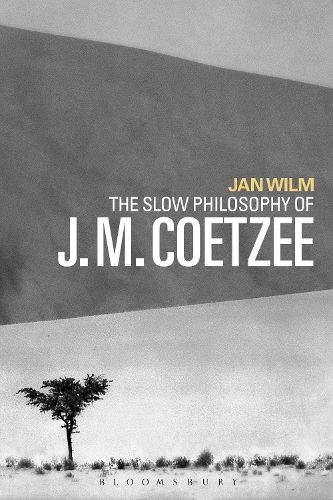
The Slow Philosophy of J. M. Coetzee
(Paperback)
Available Formats
Publishing Details
The Slow Philosophy of J. M. Coetzee
By (Author) Dr Jan Wilm
Bloomsbury Publishing PLC
Bloomsbury Academic
28th December 2017
United Kingdom
Classifications
Tertiary Education
Non Fiction
Literature: history and criticism
Literary studies: c 1900 to c 2000
Literary studies: fiction, novelists and prose writers
Physical Properties
Paperback
264
372g
Description
In The Slow Philosophy of J.M. Coetzee Jan Wilm analyses Coetzees singular aesthetic style which, he argues, provokes the reader to read his works slowly. The effected slow reading is developed into a method specifically geared to analyzing Coetzees singular oeuvre, and it is shown that his works productively decelerate the reading process only to dynamize the readers reflexion in a way that may be termed philosophical. Drawing on fresh archival material, this is the first study of its kind to explore Coetzees writing process as already slow; as a program of seemingly relentless revision which brings forth his uniquely dense and crystalline style. Through the incorporation of material from drafts and notebooks, this study is also the first to combine an exploration of the writers stylistic choices with a rigorous analysis of the readers responses. The book includes close readings of Coetzee's popular and lesser known work, including Disgrace, Waiting for the Barbarians, Elizabeth Costello, Life and Times of Michael K and Slow Man.
Reviews
[An] excellent new book ... Wilm shows that [Coetzee's] books "go beyond the mere provision of philosophical topics" and reveal their import through an act of "slow reading". * Times Literary Supplement *
By elaborating an approach that is at once both intriguingly conventional (slow reading) and excitingly innovative (slow philosophising), Wilms work constitutes a nuanced addition to the burgeoning field of Coetzee Studies, making the monograph exemplary of the work of that which Coetzee terms the truly creative critic. * Brief Encounters *
Slowness is Beauty: Pounds Cantos echo Binyons dictum and turn it into a modernist motto. Jan Wilms alert and thoughtful book energizes the motto by joining fictional syntax and philosophical meditation in patient analyses of the manuscripts. The craft of slowness is shown to underpin the work of Coetzee as he rethinks high modernism. The point is to frustrate a nave wish to rush to conclusions or reach simple ideas about life, ethics and aesthetics. By learning to read more slowly, we read up on a dauntingly complex world, letting its beauty shine while discriminating between equivocal values. * Jean-Michel Rabat, University of Pennsylvania, USA *
Since the publication of Elizabeth Costello (2003), a lively conversation has developed around Coetzee in philosophy, and philosophy in Coetzee. Jan Wilm brings a new dimension to this debate in The Slow Philosophy of J.M. Coetzee, showing in a series of refreshing readings how the philosophical and the literary come together in a single experience of slow reading. Both erudite and accessible, and drawing fresh insights from Coetzees archive, Wilm provides an original account of the Nobel laureates distinctively meditative fiction. * David Attwell, University of York, UK *
Joining advocates for slow food and slow cinema, Wilm (Goethe Univ. Frankfurt, Germany) offers a challenging proposal for slow philosophy as seen in the work of South African Nobel Prize novelist J. M. Coetzee. In critiquing Coetzees work, Wilm provides a slow-reading methodology that can be adapted to reading in general. The author sets out his goals in his lively introduction: to explore "how Coetzees oeuvre probes the functions and effects of slowness" and how it "bears on the characters and ... the readers reflections. To accomplish this, Wilm delves into Coetzees prose style, examining the ways in which Coetzee deploys syntax, dialogue, rhetorical questions, gaps in the narrative, metafiction, and ambiguous endings to slow the reader's progress through the text and to engender meditation and meaning making. The novels that receive particular attention are Disgrace, Foe, Life and Times of Michael K, Slow Man, and Coetzees fictionalized memoir trilogy (Boyhood, Youth, and Summertime). The persuasiveness of Wilms arguments is bolstered by his extensive use of Coetzees own notebooks and drafts, housed in the archives of the University of Texas. These documents enable Wilm to trace the deliberations and revisions Coetzee makes as a writer, his slowness of method. Summing Up: Highly recommended. Lower-division undergraduates through faculty. * CHOICE *
[Wilm] presents his insightful thoughts in a style that is elegant, very accessible, and most refreshing in shunning any academic jargon. The implications of his study certainly go far beyond the works of J.M. Coetzee only; the introduction in particular provides a guide to a careful good reading that is of universal significance and reminds us of literature's value. * Anglistik: International Journal of English Studies *
Author Bio
Jan Wilm is a Lecturer in English Literature at Goethe University Frankfurt, Germany. He is co-editor, with Mark Nixon, of Samuel Beckett und die deutsche Literatur (2013).
